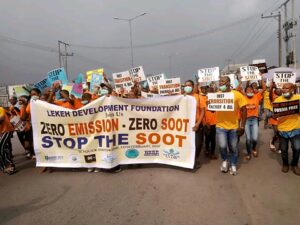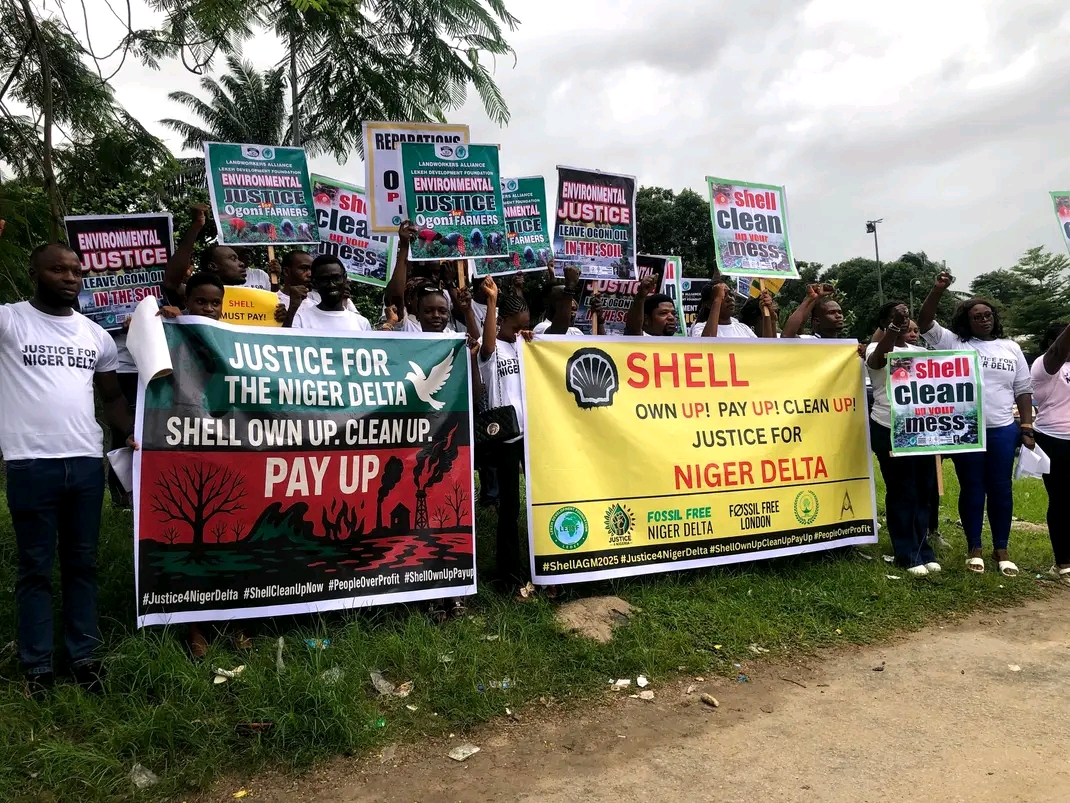By Promise Eze
John Barilubari Lucky was heartbroken in 2022 when his father told him that the family farm had produced little harvest that year. He had struggled to raise money for his school fees in his first year at Rivers State University.
Now a declining harvest meant that he might have to drop out. More than just a personal setback, this pointed at a deeper crisis: how oil exploration and spills had damaged his ancestral land.
“Our farmlands have been cloaked in oil and destroyed. We are not farming anymore. Wherever you plant, it will not even grow. You will not even see the benefit of what you planted,” Lucky bemoaned, adding that his father was forced to sell his only land to pay his fees.
A toxic mix of pollution and poverty
Nigeria’s discovery of oil in the 1950s was envisioned to bring prosperity, especially for the Niger Delta region, where the country’s largest crude reserves are situated. Several decades later, the oil-rich region has received a mix of pollution and poverty in return.
No fewer than 40 million litres of oil are spilt every year across the Niger Delta. In Ogoniland, Lucky’s hometown, repeated oil spills have not only destroyed farmland but have also made water unsafe for locals, as a UN report discovered.
When promises to clean up the land came short, frustration spilt over. Militant groups, mostly comprising disenchanted youths left without jobs, began attacking oil facilities in the region to register their grievances against the widespread pollution and the government’s neglect.
In response, the government dispatched troops to the region, in what became a serious violation against human rights. Homes were set ablaze, locals were arrested, and some were killed.
Environmental activist Ken Saro-Wiwa was one of nine others who were executed in 1995 by the Sani Abacha regime—a murder that shocked the world and showed how much the government would brook no protest.
In 2009, a new national government introduced an amnesty programme to encourage peace. Still most residents believe that addressing the problems of pollution, poverty, and underdevelopment will create enduring peace in the Niger Delta.
Galvanising young voices
Growing up amidst these crises, Lucky yearned to change his community for the better. Armed violence was on the rise as more and more youths joined militant groups. But he had no desire to seek change down the barrel of a gun.
In 2023, he joined the Lekeh Development Foundation, a collective of youths pushing for environmental justice in the Niger Delta, where he’s led outreaches, organised events, and engaged with community members to raise awareness about climate change.
“The foundation has opened my mind to a wider understanding of the environment and why we need a clean, healthy environment as well,” he said. “I help organise programmes in my community three times a year on environmental and climate justice.”
As part of his campaigns, Lucky interacts with many young people, teaching them how to engage the government diplomatically rather than resort to violence.
“I really believe young people in the Niger Delta should be part of an initiative that caters to the rights of the environment and the well-being of the Niger Delta people.”
The foundation derives its name from the Ogoni word “Lekeh,” which means “a comfortable, beautiful environment where every human being would love to be and live,” explained Friday Nbani, the founder. “Our passion and interest is already in this space of protecting and defending Mother Earth.”
Experts reckon that the young demographic plays a prominent role in reversing the ruinous legacy of oil exploration in the Niger Delta.
“Mobilising them means tapping into their creativity and deep connection to the region. It can help bridge the gap between traditional knowledge and innovative solutions, demand accountability, and drive grassroots-to-national advocacy for sustainable development,” remarked Dolyamba Bara Gabriel, Conservation Education Officer with the Forest Citizen Conservation Foundation.
Indeed, Lekeh’s network of 20 volunteers has broadened its environmental campaigns to hundreds of youths and community leaders in areas such as Port Harcourt, Ogoni and Bori.

Nbani says he was inspired to start up the foundation based on the heartrending memories he witnessed in the aftermath of an oil spill—families pushed into poverty, aggrieved youths forced to take up arms as retribution, and many turning to oil bunkering in a desperate bid to survive.
Through a series of bootcamps, Nbani teaches young climate enthusiasts about non-violent methods of holding the government to account.
“Our mission is to ensure that these resilient camps can train and equip a network of young leaders through an intensive residential programme that combines practical environmental restoration, sustainable environmental knowledge, cultural preservation, and social justice advocacy,” he said.
For Shalom Amakiri, a student of law, a surge of respiratory illnesses and water pollution in her community caused by gas flaring from the oil companies prompted her to join the foundation, where she found a community of young climate enthusiasts. This has helped her to rally for climate justice in her community.
“I know that there are laws that govern oil spillage, which are meant to regulate the companies responsible for oil spills. To a large extent, however, these laws are not enforced, and that’s why we continue to have all these problems,” she explained.
Laws and lapses
Despite grassroots efforts, the broader legal frameworks still present gaps in enforcement.
Passed in 2021, the Petroleum Industry Act (PIA) was created to improve transparency in Nigeria’s oil and gas sector, extending full benefits to those affected by crude exploration. Part of the law mandates oil companies to fork out three percent of their annual spending to support development in host communities while protecting the environment.
To reduce the incidence of oil spillage, the Environmental Impact Assessment (EIA) Act, meanwhile, requires companies to run surveys and review the nature of their projects before they start operations.
Most companies flout these rules and conduct weak assessments, leaving a pile of oil spills, pollution and broken promises afterwards.
This is why Amakiri, the law student, believes young people should be involved in the fight for climate and environmental justice.
“We are the ones who can think quickly and look for solutions,” she remarked. “We are the ones who can do more of the grassroots work; by that, I mean coming together as a group, raising awareness, and helping people understand what is happening.”
These days, Lucky continues to push for change, writing to government officials, organising petitions, and holding town hall meetings—even when met with indifference. But he is undeterred.
“When the people have been tampered with, and their cries, their pleas, are not being heard or properly addressed, I think they will look for the next opportunity to help themselves, which often means resorting to violence,” he said. “But we will not stop advocating for justice.”
It is this same quest for justice that drives Amakiri. “It’s not by carrying arms that you get what you want,” she said. “It’s by putting practical aspects and being strategic about your movement.”
John Barilubari Lucky's experience in 2022 reflects the broader crisis in Nigeria's Niger Delta caused by extensive oil pollution. Oil spills have significantly harmed agriculture and water safety in Ogoniland, leading to economic setbacks and increased poverty. Efforts to clean up have often failed, resulting in unrest and militancy among youths. In response, the government introduced an amnesty program in 2009, though residents argue that addressing pollution, poverty, and underdevelopment will achieve lasting peace.
Lucky and others have opted for non-violent advocacy. He joined the Lekeh Development Foundation, aiming to promote environmental justice without resorting to violence. The foundation, inspired by the harsh realities of pollution, empowers young people through training programs focused on sustainable development and non-violent government accountability. It emphasizes young people’s vital role in reversing environmental damages through grassroots activism, as highlighted by experts who believe mobilizing youth can bridge traditional and innovative solutions, driving systemic change.
Despite the Petroleum Industry Act and the Environmental Impact Assessment Act aimed at mitigating oil spillages, enforcement is weak, often leading to continued environmental issues. Activists like Lucky and Shalom Amakiri continue to advocate for strategic, non-violent solutions, seeking justice and change through petitions, education, and dialogues, emphasizing that collective, informed grassroots efforts are crucial to tackling these challenges effectively.






